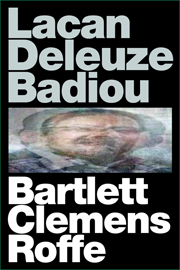6 - Polemos
Published online by Cambridge University Press: 05 September 2014
Summary
CIA Superior: What did we learn, Palmer?
CIA Officer: I don't know, sir.
CIA Superior: I don't fuckin’ know either. I guess we learned not to do it again.
(Denouement, Burn After Reading, Coen Brothers [2008])This book has been neither a variant of liturgy, nor a paean to polyamory, nor a fake geopolitical imbroglio, nor even a contribution to gymnastic or economic improvement. Or, at least, it has attempted not to be. To that end, we have structured it as a regulated sequence of essays upon crucial conceptual problematics: the contemporary; time; the event; and truth. In doing so, we have not only exposed hitherto-disavowed complicities between our thinkers – such that even the avowed lineages of influence don't quite capture these intricacies – but have further suggested even more vicious and incommensurable differences than are usually suspected. But it is perhaps only here, belatedly, that we are able to properly repeat ourselves in a compressed and violent fashion – having, unlike our cinematic CIA comrades, not yet learned not to do it again.
Lacan
So: how would Lacan respond to the alleged ‘critiques’ levelled at him by Deleuze and Badiou? Regarding the rethinking of the ‘contemporary’, we believe his response would be clear: the contemporary can only be remade by free association. Otherwise, we will find the return of tyranny at the heart of thought, exemplified by the hypocrisy of philosophers.
- Type
- Chapter
- Information
- Lacan Deleuze Badiou , pp. 221 - 233Publisher: Edinburgh University PressPrint publication year: 2014



